General Sir John Monash, Personal Files Book 17, 14 January - 11 February 1918, Part 5
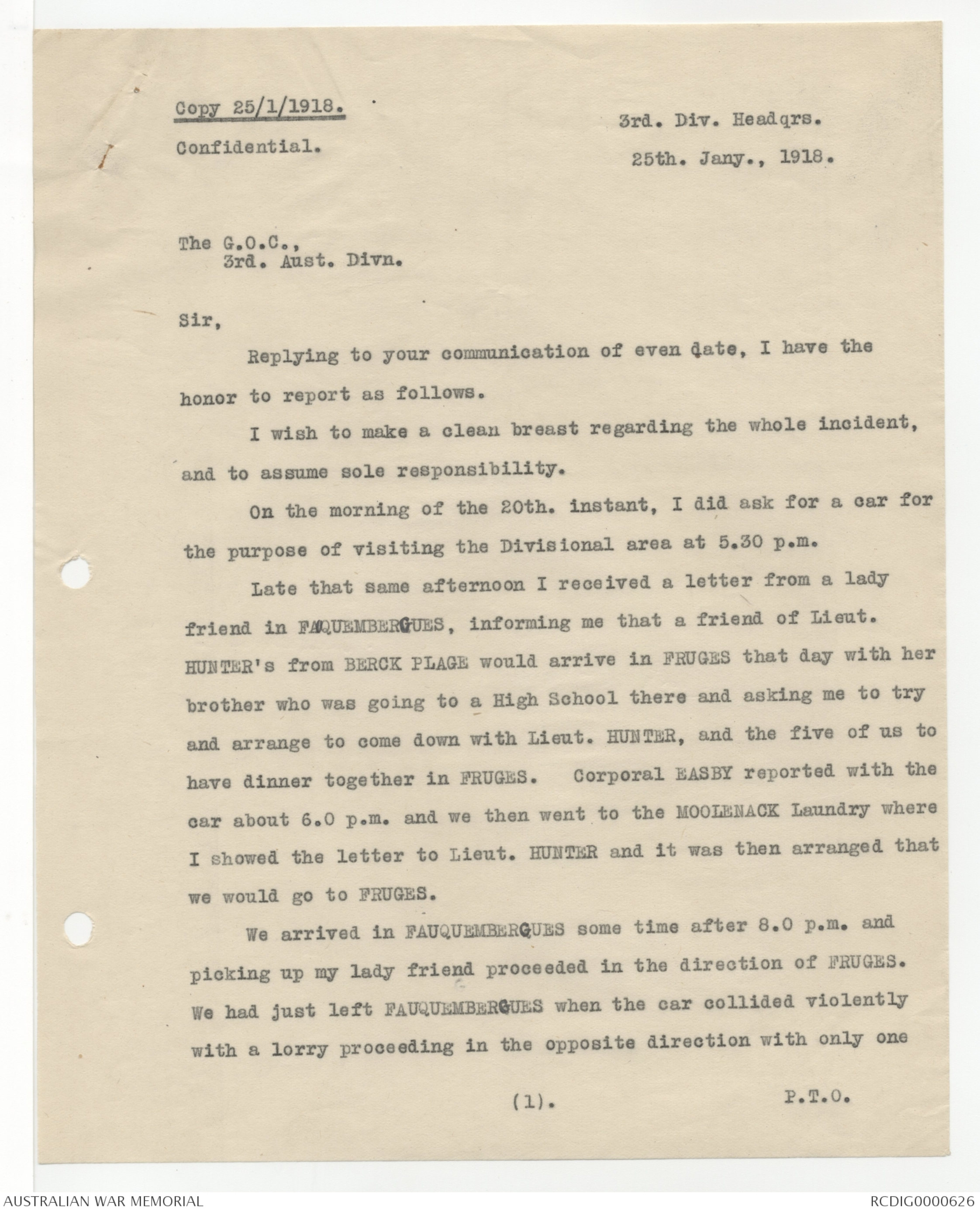
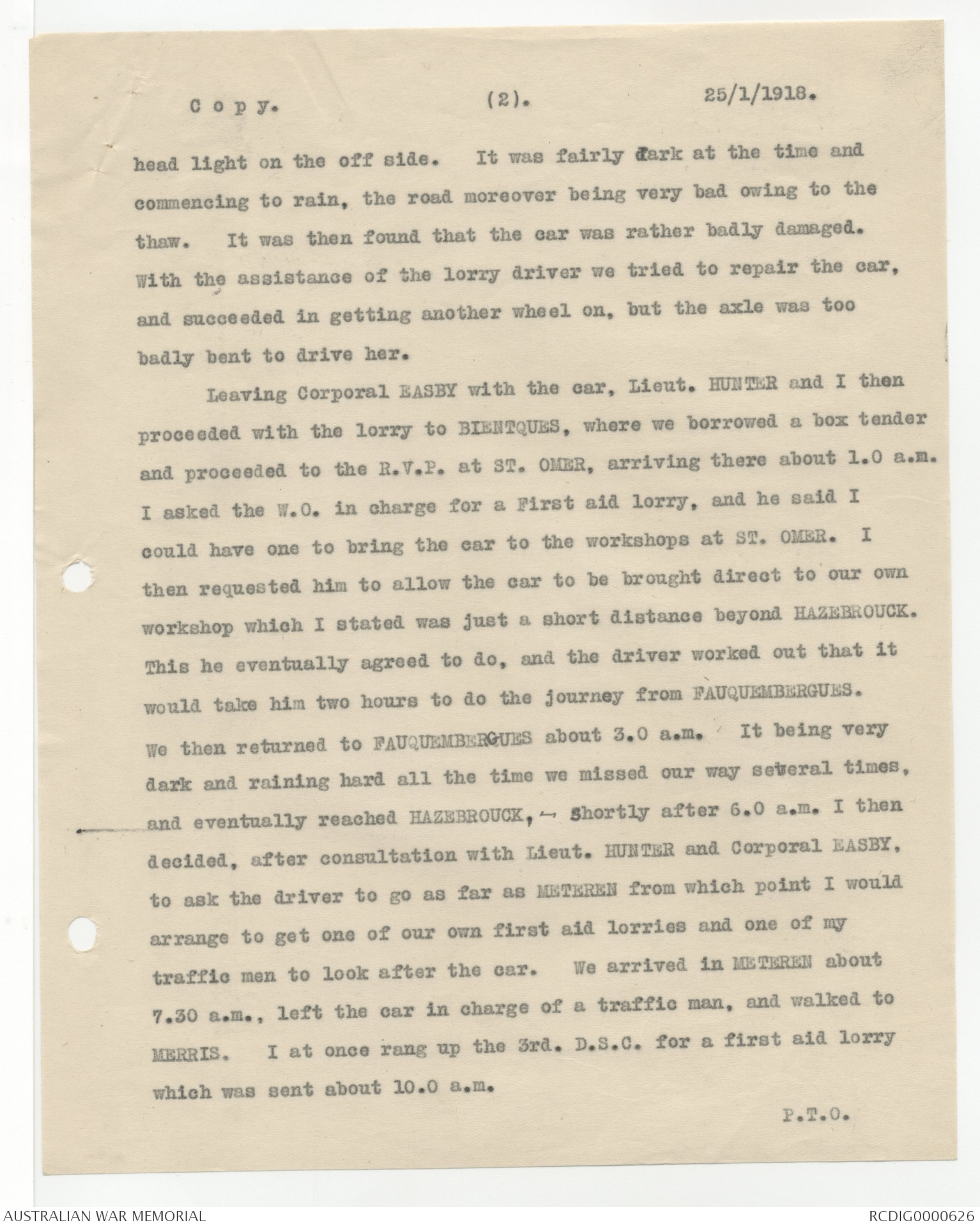
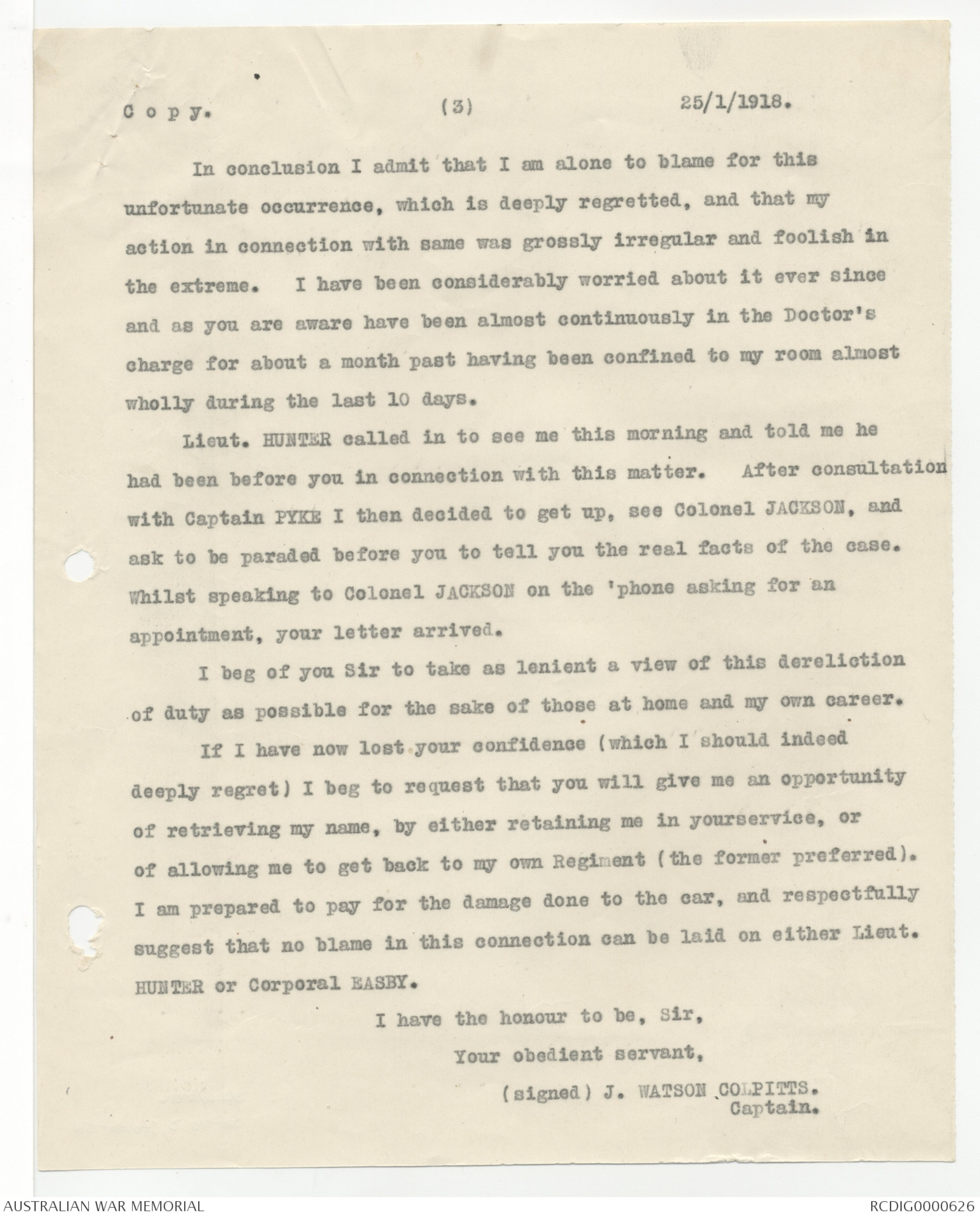
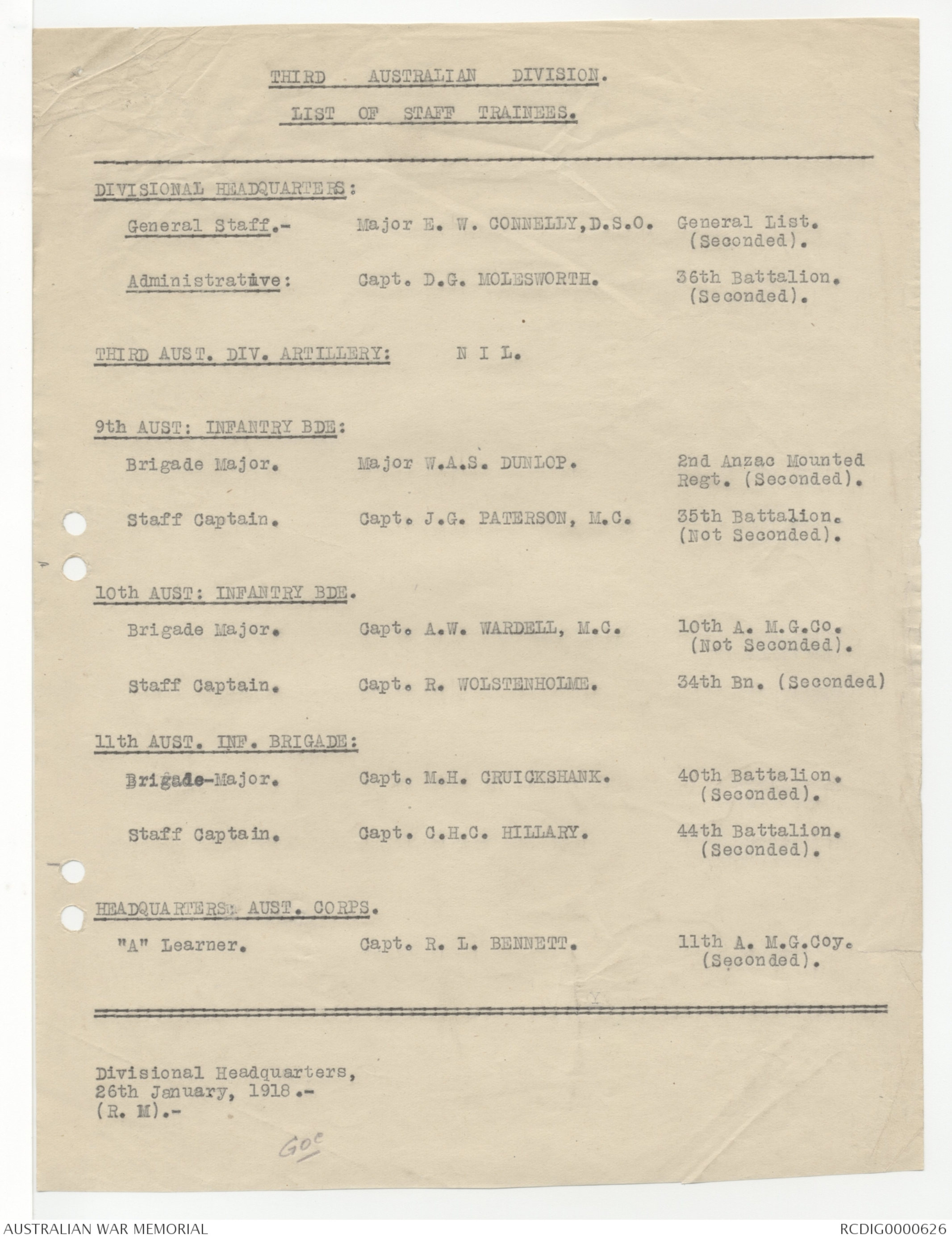
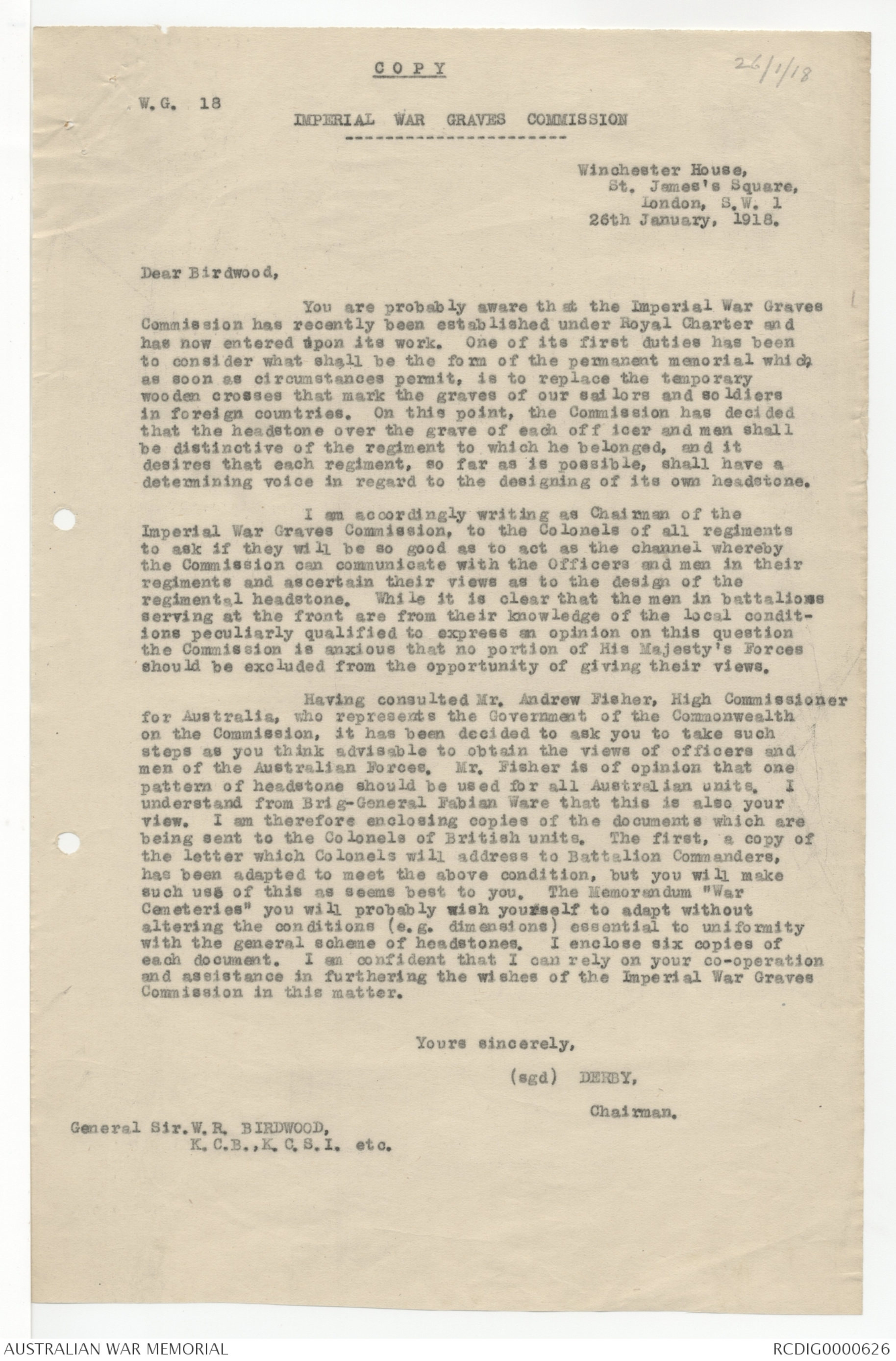
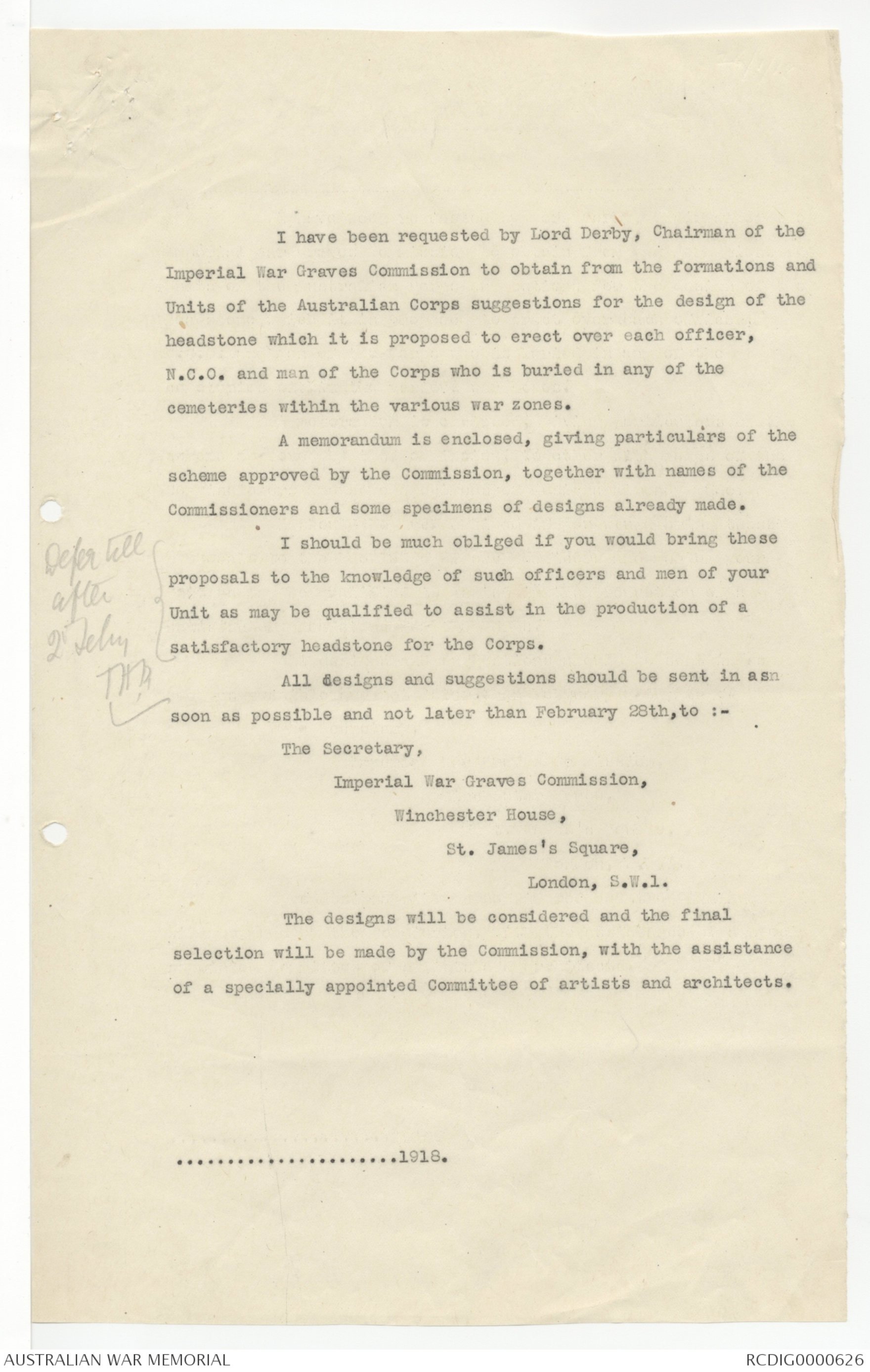
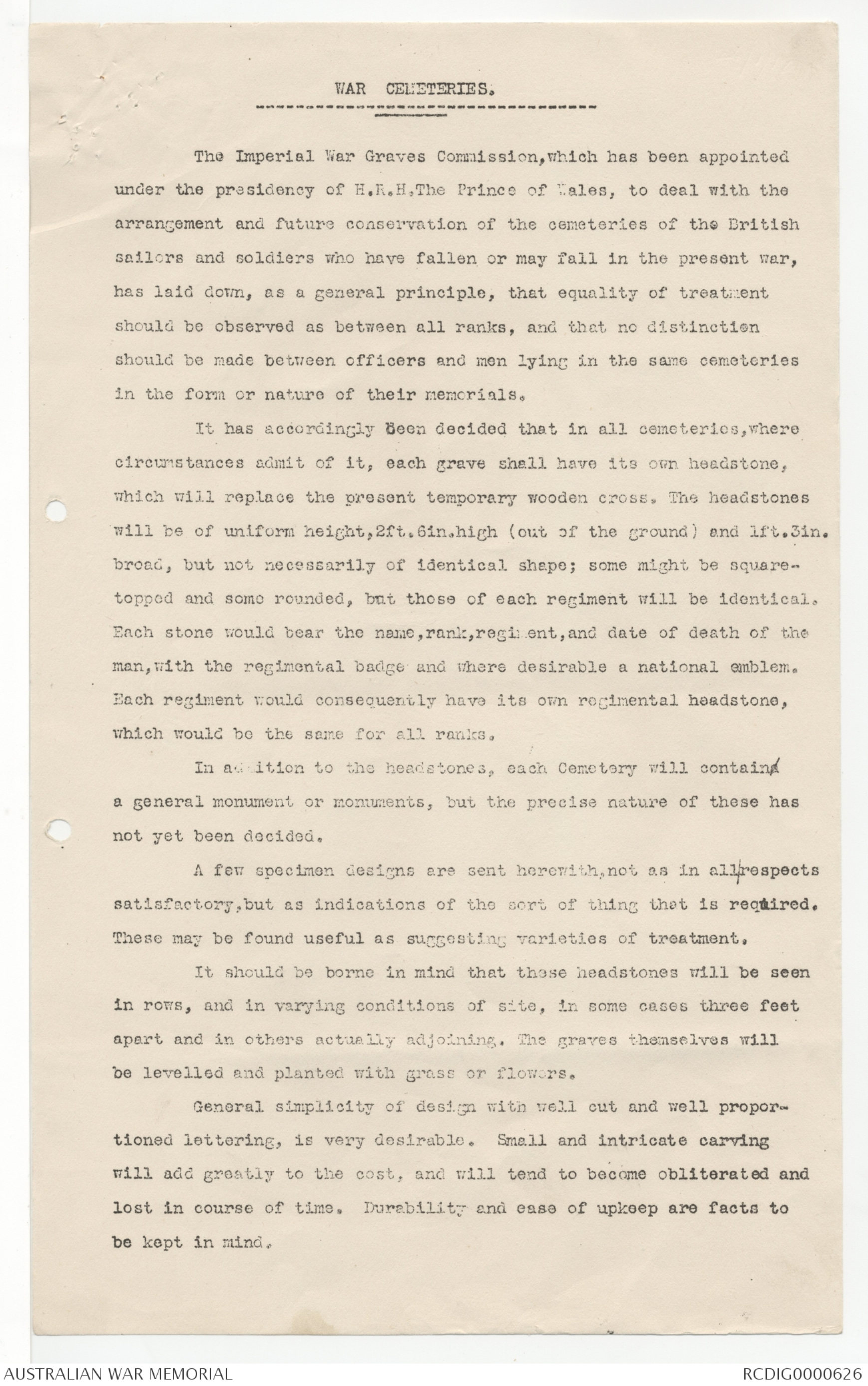
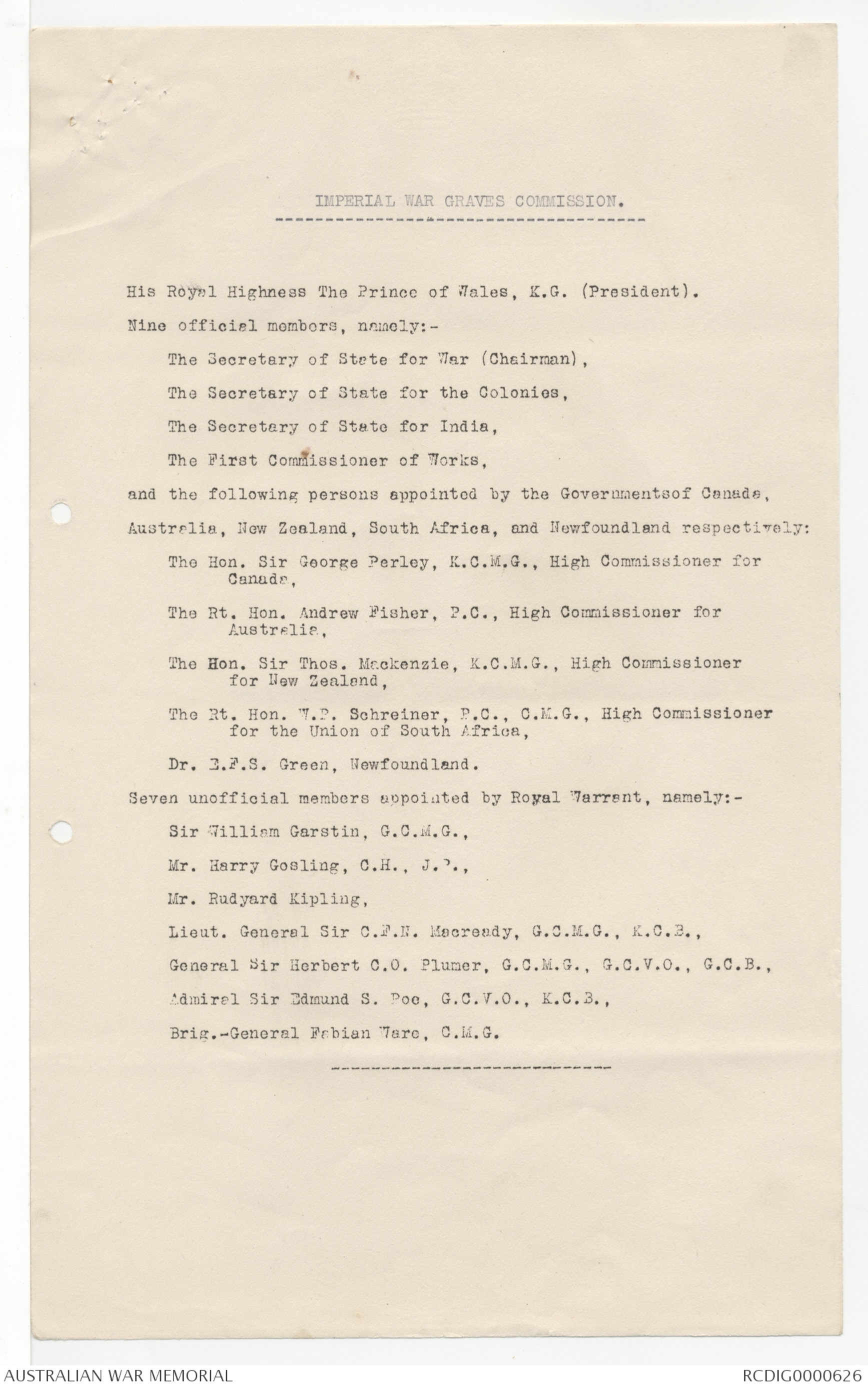
Copy 25/1/1918.
Confidential
3rd. Div. Headers.
25th. Jany., 1918.
The G.O.C.,
3rd. Aust. Divn.
Sir.
Replying to your communication of even date, I have the
honor to report as follows.
I wish to make a clean breast regarding the whole incident,
and to assume sole responsibility.
On the morning of the 20th. instant, I did ask for a car for
the purpose of visiting the Divisional area at 5.30 p.m.
Late that same afternoon I received a letter from a lady
friend in FAQUEMBERGUES, informing me that a friend of Lieut.
HUNTER's from BERCK PLAGE would arrive in FRUGES that day with her
brother who was going to a High School there and asking me to try
and arrange to come down with Lieut. HUNTER, and the five of us to
have dinner together in FRUGES. Corporal EASBY reported with the
car about 6.0 p.m. and we then went to the MOOLENACK Laundry where
I showed the letter to Lieut. HUNTER and it was then arranged that
we would go to FRUGES.
We arrived in FAUQUEMBERGUES some time after 8.0 p.m. and
picking up my lady friend proceeded in the direction of FRUGES.
We had just left FAUQUEMBERGUES when the car collided violently
with a lorry proceeding in the opposite direction with only one
P.T.O
(1).
Copy. (2). 25/1/1918.
head light on the off side. It was fairly dark at the time and
commencing to rain, the road moreover being very bad owing to the
thaw. It was then found that the car was rather badly damaged.
With the assistance of the lorry driver we tried to repair the car,
and succeeded in getting another wheel on, but the axle was too
badly bent to drive her.
Leaving Corporal EASBY with the car, Lieut. HUNTER and I then
proceeded with the lorry to BIENTQUES, where we borrowed a box tender
and proceeded to the R.V.P. at ST. OMER, arriving there about 1.0 a.m.
I asked the W.O. in charge for a First aid lorry, and he said I
could have one to bring the car to the workshops at ST. OMER. I
then requested him to allow the car to be brought direct to our own
workshop which I stated was just a short distance beyond HAZEBROUCK.
This he eventually agreed to do, and the driver worked out that it
would take him two hours to do the journey from FAUQUEMBERGUES.
We then returned to FAUQUEMBERGUES about 3.0 a.m. It being very
dark and raining hard all the time we missed our way several times,
and eventually reached HAZEBROUCK, - shortly after 6.0 a.m. I then
decided, after consultation with Lieut. HUNTER and Corporal EASBY,
to ask the driver to go as far as METEREN from which point I would
arrange to get one of our own first aid lorries and one of my
traffic men to look after the car. We arrived in METEREN about
7.30 a.m., left the car in charge of a traffic man, and walked to
MERRIS. I at once rang up the 3rd. D.S.C. for a first aid lorry
which was sent about 10.0 a.m.
P.T.O.
Copy. (3) 25/1/1918.
In conclusion I admit that I am alone to blame for this
unfortunate occurrence, which is deeply regretted, and that my
action in connection with same was grossly irregular and foolish in
the extreme. I have been considerably worried about it ever since
and as you are aware have been almost continuously in the Doctor's
charge for about a month past having been confined to my room almost
wholly during the last 10 days.
Lieut. HUNTER called in to see me this morning and told me he
had been before you in connection with this matter. After consultation
with Captain PYKE I then decided to get up, see Colonel JACKSON, and
ask to be paraded before you to tell you the real facts of the case.
Whilst speaking to Colonel JACKSON on the 'phone asking for an
appointment, your letter arrived.
I beg of you Sir to take as lenient a view of this dereliction
of duty as possible for the sake of those at home and my own career.
If I have now lost. your confidence (which I should indeed
deeply regret) I beg to request that you will give me an opportunity
of retrieving my name, by either retaining me in yourservice, or
of allowing me to get back to my own Regiment (the former preferred).
I am prepared to pay for the damage done to the car, and respectfully
suggest that no blame in this connection can be laid on either Lieut.
HUNTER or Corporal EASBY.
I have the honour to be, Sir,
Your obedient servant,
(signed) J. WATSON COLPITTS.
Captain.
THIRD AUSTRALIAN DIVISION.
LIST OF STAFF TRAINEES
––––––––––––––––––––––––––––––––––––––––––––––––––––––––––––––––––––––––
DIVISIONAL HEADQUARTERS:
General Staff. -Major E. W. CONNELLY , D.S.O. General List.
(Seconded)
Administrative: Capt. D.G. MOLESWORTH. 36th Battalion
(Seconded)
THIRD AUST. DIV. ARTILLERY: N I L.
9th AUST: INFANTRY BDE:
Brigade Major Major W.A.S. DUNLOP. 2nd Anzac Mounted
Regt. (Seconded)
Staff Captain. Capt. J.G PATERSON M.C. 35th Battalion.
(Not Seconded).
10th AUST: INFANTRY BDE.
Brigade Major. Capt. A.W. WARDELL, M.C. 10th A. M.G.Co.
(Not Seconded)
Staff Captain. Capt. R. WOLSTENHOLME. 34th Bn. (Seconded)
11th AUST. INF. BRIGADE:
Brigade-Major. Capt. M.H. CRUICKSHANK. 40th Battalion
(Seconded)
Staff Captain. Capt. C.H.C. HILLARY. 44th Battalion.
(Seconded)
Divisional Headquarters Corps
"A" Learner. Capt. R.L. BENNETT 11th A. M.G.Coy
(Seconded)
==============================================================
Divisional Headquarters
26th January, 1918.-
(R. M).-
GOC
COPY 26/1/18
W.G. 18
IMPERIAL WAR GRAVES COMMISSION
Winchester House,
St. James's Square,
London, S.W. 1
26th January, 1918.
Dear Birdwood,
You are probably aware th at the Imperial War Graves
Commission has recently been established under Royal Charter and
has now entered upon its work. One of its first duties has been
to consider what shall be the form of the permanent memorial which
as soon as circumstances permit, is to replace the temporary
wooden crosses that mark the graves of our sailors and soldiers
in foreign countries. On this point, the Commission has decided
that the headstone over the grave of each officer and men shall
be distinctive of the regiment to which he belonged, and it
desires that each regiment, so far as is possible, shall have a
determining voice in regard to the designing of its own headstone.
I am accordingly writing as Chairman of the
Imperial War Graves Commission, to the Colonels of all regiments
to ask if they will be so good as to act as the channel whereby
the Commission can communicate with the Officers and men in their
regiments and ascertain their views as to the design of the
regimental headstone. While it is clear that the men in battalions
serving at the front are from their knowledge of the local conditions
peculiarly qualified to express an opinion on this question
the Commission is anxious that no portion of His Majesty's Forces
should be excluded from the opportunity of giving their views.
Having consulted Mr. Andrew Fisher, High Commissioner
for Australia, who represents the Government of the Commonwealth
on the Commission, it has been decided to ask you to take such
steps as you think advisable to obtain the views of officers and
men of the Australian Forces, Mr. Fisher is of opinion that one
pattern of headstone should be used for all Australian units, I
understand from Brig-General Fabian Ware that this is also your
view. I am therefore enclosing copies of the documents which are
being sent to the Colonels of British units. The first, a copy of
the letter which Colonels will address to Battalion Commanders,
has been adapted to meet the above condition, but you will make
such use of this as seems best to you. The Memorandum "War
Cemeteries" you will probably wish yourself to adapt without
altering the conditions (e.g. dimensions) essential to uniformity
with the general scheme of headstones. I enclose six copies of
each document. I am confident that I can rely on your co-operation
and assistance in furthering the wishes of the Imperial War Graves
Commission in this matter.
Yours Sincerely,
(sgd) DERBY,
Chairman.
General Sir BIRDWOOD,
K.C.B.,K.C.S.I. etc.
I have been requested by Lord Derby, Chairman of the
Imperial War Graves Commission to obtain from the formations and
Units of the Australian Corps suggestions for the design of the
headstone which it is proposed to erect over each officer,
N.C.O. and man of the Corps who is buried in any of the
cemeteries within the various war zones.
A memorandum is enclosed, giving particulars of the
scheme approved by the Commission, together with names of the
Commissioners and some specimens of designs already made.
[*Defer till
after
2nd July
THD*] I should be much obliged if you would bring these
proposals to the knowledge of such officers and men of your
Unit as may be qualified to assist in the production of a
satisfactory headstone for the Corps.
All designs and suggestions should be sent in asn
soon as possible and not later than February 28th,to :-
The Secretary,
Imperial War Graves Commission,
Winchester House,
St. James's Square,
London, S.W.1.
The designs will be considered and the final
selection will be made by the Commission, with the assistance
of a specially appointed Committee of artists and architects.
. . . . . . . . . . . . . . . . . . . . .. 1918.
WAR CEMETERIES.
-------------------------------
The Imperial War Graves Commission, which has been appointed
under the presidency of H.R.H.The Prince of Wales, to deal with the
arrangement and future conservation of the cemeteries of the British
sailors and soldiers who have fallen or may fall in the present war,
has laid down, as a general principle, that equality of treatment
should be observed as between all ranks, and that no distinction
should be made between officers and men lying in the same cemeteries
in the form or nature of their memorials.
It has accordingly been decided that in all cemeteries,where
circumstances admit of it, each grave shall have its own headstone,
which will replace the present temporary wooden cross. The headstones
will be of uniform height, 2ft. 6in. high (out of the ground) and 1ft.3in.
broad, but not necessarily of identical shape; some might be square-
topped and some rounded, but those of each regiment will be identical.
Each stone would bear the name,rank, regiment, and date of death of the
man,with the regimental badge and where desirable a national emblem.
Each regiment would consequently have its own regimental headstone,
which would be the same for all ranks.
In addition to the headstones, each Cemetery will contains
a general monument or monuments, but the precise nature of these has
not yet been decided.
A few specimen designs are sent herewith, not as in all/respects
satisfactory,but as indications of the sort of thing that is required.
These may be found useful as suggesting varieties of treatment.
It should be borne in mind that these headstones will be seen
in rows, and in varying conditions of site, in some cases three feet
apart and in others actually adjoining. The graves themselves will
be levelled and planted with grass or flowers.
General simplicity of design with well cut and well proportioned
lettering, is very desirable. Small and intricate carving
will add greatly to the cost, and will tend to become obliterated and
lost in course of time. Durability and ease of upkeep are facts to
be kept in mind.
IMPERIAL WAR GRAVES COMMISSION.
--------------------------------
His Royal Highness The Prince of Wales, K.G. (President).
Nine official members, namely:-
The Secretary of Stete for War (Chairman),
The Secretary of State for the Colonies,
The Secretary of State for India,
The First Commissioner of Works,
and the following persons appointed by the Governmentsof Canada,
Australia, New Zealand, South Africa, and Newfoundland respectively:
The Hon. Sir George Perley, K.C.M.G., High Commissioner for
Canada,
The Rt. Hon. Andrew Fisher, P.C., High Commissioner for
Australia,
The Hon. Sir Thos. Mackenzie, K.C.M.G., High Commissioner
for New Zealand,
The Rt. Hon. W.P. Schreiner, P.C., C.M.G., High Commissioner
for the Union of South Africa,
Dr. 3.F.S. Green, Newfoundland.
Seven unofficial members appointed by Royal Warrant, namely:
Sir William Garstin, G.C.M.G.,
Mr. Harry Gosling, C.H., J.P.,
Mr. Rudyard Kipling,
Lieut. General Sir C.F.N. Macready, G.C.M.G., K.C.B.,
General Sir Herbert C.O. Plumer, G.C.M.G., G.C.V.O., G.C.B.,
Admiral Sir Edmund S. Poe, G.C.V.O., K.C.B.,
Brig.-General Fabian Ware, C.M.G.
---------------------
 Sam scott
Sam scottThis transcription item is now locked to you for editing. To release the lock either Save your changes or Cancel.
This lock will be automatically released after 60 minutes of inactivity.